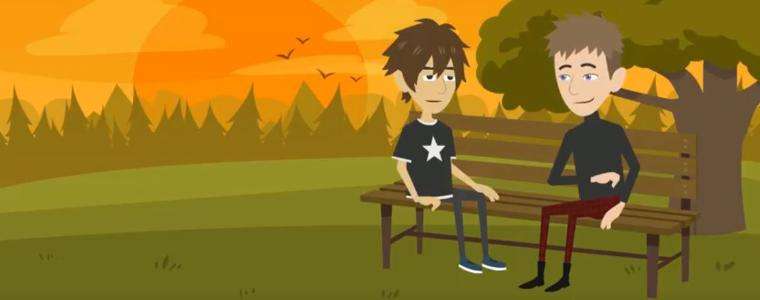Animations help students with emotional resilience

Wellbeing Practitioners at the University of the West of England (UWE Bristol) have created a series of animated videos for students to help them manage some of the typical difficulties, like anxiety and exam worries, they seek help for.
The videos come out of a successful programme set up by the University, in which students support fellow students in an innovative peer to peer programme (known as a PAL - Peer Assisted Learning - scheme). The students are trained to help others develop Emotional Resilience (ER) skills.
The animations focus on scenarios and experiences of students who took part in the programme and four animations focus on Coping with Anxiety - with Friends, in Lectures, in Crowds and related to Exams. Another film explains how to manage a panic attack. The seven Emotional Resilience skills: Emotional Awareness, Impulse Control, Optimism, Causal Analysis, Empathy, Self-efficacy and Reaching Out are featured, and are also presented in a film for tutors.
The videos have been produced drawing directly on students' own personal struggles and experiences, using their own words to normalise some of the typical difficulties students experience.
Glyn Williams, Wellbeing Practitioner, says the idea for the videos came from the students themselves.
He said, "The ER project showed us that students like short animations that normalise their struggles. The feeling of 'not being the only one' is something they report as being the biggest relief to them when they are anxious and stressed. Talking to students we also learned that they feel information early on would have made a difference to their 'mental wealth' rather than them feeling alone and isolated.
"The number of students experiencing mental health problems is on the increase in the UK. The transition from school to higher education is a huge transition and some seem to struggle, with anxiety and depression being the biggest presenters. We have found that students frequently struggle with face to face social skills and that their feelings in these situations often contrast with their experience of online interactions. For this generation (millennials) their social skills have been forged through the constant use of social media and from my point of view this makes their skill sets different to other generations. This means they may struggle with the leap from school to higher education.
"At UWE Bristol we have taken the initiative and decided to think out of the box in order to meet this need. Based on student experiences we have designed peer delivered workshops to provide coping mechanisms to improve and help students manage their challenges. These new animations complement our peer-led Emotional Resilience workshops so that we can reach more students with small sound bites of advice and other students' experiences.
"The peer to peer work has been hugely successful as students are much more relaxed and open talking to students who 'have been there'. We are providing skills based on the common struggles we see students encounter. The peer to peer model provides experiences and solutions from a student's perspective. We want these animations to normalise the student's struggle and give them the ability to better manage their own mental wealth."
The University is also working with South Gloucestershire Council on using these animations as a tool with sixth formers. Councillor Toby Savage, Chair of South Gloucestershire Council's Health Scrutiny Committee, said, "Mental health is a priority for South Gloucestershire Council. Developing awareness of the real experience of student life and normalising some of the difficulties that students may experience will enable sixth formers to be better prepared for university life. We see these animations as a useful tool to prepare sixth formers for the transition to higher education and provide them with greater awareness of the coping skills that will be useful to them throughout life."
Professor Steve West, UWE Bristol Vice-Chancellor, said, "The University is taking an active role in ensuring the wellbeing of our students is a top priority. The work on Emotional Resilience at UWE Bristol is absolutely brilliant, particularly in view of the fact that it is run by students and rolled out on a peer to peer basis. We want to be recognised as a caring university that does not shy away from tackling serious issues but rather acts proactively to support students when they go through difficult times for whatever reason."
Provided by University of the West of England


















